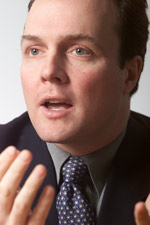London Business School: Gain the Executive Edge - Rory Simpson and Julian Birkinshaw
To address the global downturn, business schools have adapted to meet management needs. CEO talks to London Business School’s Rory Simpson and Julian Birkinshaw about how tailored programmes are becoming part of the solution.
Executive education, along with other areas of corporate spend such as travel and advertising, seems a likely candidate for cost-cutting as companies feel the pinch of the economic downturn. It might seem more logical to have executives at their desks facing the challenges head-on rather than taking time out to develop their skills, but interest in programmes at business schools is holding firm.
In fact, some leading business schools are seeing the appetite for executive education grow, both for the open programmes that develop tomorrow’s leaders and for customised programmes that address specific business issues for organisations.
‘It is a good time for executives to develop their skills and prepare for the future,’ says Rory Simpson, associate dean for executive education at London Business School. ‘Top tier executives and high-potential people have more to handle now, especially if a firm is cutting its workforce, so they need the right skills.’
For over 40 years, London Business School has been growing into one of the world’s leading centres for business education. Its faculty numbers over 150, and over 6,000 students from around the world attend its executive education programmes each year.
Nearly 30,000 alumni span the globe. Its programmes range from an MBA to a Masters in Finance, and its broad range of executive education programmes attract ever more students.
They are designed to give people space to think about issues such as strategy, innovation and creativity that can often be driven out by the day-to-day tasks of managing people and operations. Furthermore, its programmes are backed by some of the most highly rated research capabilities anywhere in the world. ‘We become part of the DNA of our clients’ companies, so we are very busy with our existing clients, especially in the customised portfolio,’ notes Simpson.
This year marks the 20th anniversary of the launch of the school’s Accelerated Development Programme (ADP). The steady evolution of the programme shows that many key elements of executive education remain a necessity despite fluctuating market conditions. Alongside that, however, a growing need has emerged for companies to enhance a particular skill or gain insight into a specific business issue, either for tactical reasons or to align with an evolving business model.
This has seen the rise of shorter, tailored programmes, which change far more rapidly than longer programmes such as the ADP.
‘Twenty years ago these would be just a short version of the degree programmes, but now they are highly customised to clients’ needs,’ says Julian Birkinshaw, London Business School’s deputy dean of programmes. ‘There has been a shift from the case-based, Harvard model to a more experiential model. They are also getting shorter, and we now have a new range of two-day programmes.’
Adapt to survive
Vital to the success of executive education programmes is their ability to adapt to the changing needs of clients. Business school faculty must stay firmly on top of the latest trends and challenges.
‘The world changes quickly, and every era is supposed to be more dynamic than the previous decade, but there is no evidence that the world is more turbulent than in the past, although events of the last year are extreme,’ says Birkinshaw. ‘Some parts of the corporate world change less quickly, so the important thing is that we are writing and teaching about those things that are changing fast.’
For Simpson, everything is driven by their clients' needs. ‘We bridge the gap between academic research and practicality, so we can adapt what we do,’ he says.
This ethos is evident in the current suite of programmes addressing how to manage a business in a downturn.
‘They include ways of measuring the upside of a downturn, which for many companies can be a burning platform from which to make difficult decisions,’ adds Simpson.
Last year, London Business School extended its open programmes portfolio by offering two-day Executive Workouts, providing business leaders with the opportunity to focus on one of a number of elements relating to strategy, coaching, growth and governance.
‘The two-day programmes are much more focused on one set of issues,’ notes Birkinshaw. ‘These Executive Workout programmes are designed to provide attendees with practical tools that they can take back to their business. Companies are much more discerning about what they buy, so we must be clear about what people will take home.’
As well as its renowned research capability, the school has also developed its approach to programme delivery, which is critical for the success of shorter programmes. The experiential quality of the sessions can have a dramatic influence on their effectiveness and drive home key messages in a short time. As many programmes use practical examples related to clients’ business they can go beyond theoretical models to unearth more practical realisations.
Birkinshaw teaches on a five-day programme on developing strategy, during which people can offer a real problem that will be subjected to strategic analysis. They are then able to try out different strategies to resolve that problem with the help of the tutor. Birkinshaw believes that experiential learning is extremely effective and helps companies avoid the infinite loop that can form when people only learn from their competitors, an approach that yields little competitive advantage.
‘You can learn the principles of strategy and negotiation from a case study and from faculty members, but then we apply them to your own business,’ he says.
‘There is also a sense of discovery when people are working outside their comfort zone and figuring out their own conclusions. They might visit a theatre group or a young offenders institute, for instance, and we facilitate the connection from that experience back to the context they know.
‘Also, when you are a senior executive you always have experiences from your own career that we can examine to find new ways of making sense of them. The value of experience stands out more when it is put in a different context. In that way learning can be unique to the individual.’
Beyond academics
For Simpson, tailoring programmes to be ever more aligned with clients’ business needs should be the primary goal for any business school. He also understands that in order to develop the right programmes a business school must get close to its clients and in some ways become more than an academic institution.
‘We act as an advisor as well as service provider. Just like healthcare, executive education is becoming much more personalised,’ he explains.
Part of this personalisation process is to develop blended learning solutions, where some programme elements can be completed remotely or over the internet. This can certainly help students with preparation for upcoming programmes, but at London Business School it will only ever be in support of classroom learning, where the power of debate and comes to the fore.
In this, London has an advantage in that it is a cosmopolitan city, a world business centre, and a natural centre of gravity for the world’s business and political leaders. London Business School not only attracts high-profile speakers, but also an impressive diversity of students from all over the globe, which helps to bring the best out of individuals and stimulates dynamic group sessions.
‘The world likes to come to London. We have the flexibility, history, and strength in faculty and research that companies are looking for. We have 20 years of data that we can use to test different models and help our clients answer the difficult questions,’ Simpson says.
‘People once said that open programmes were dead, but ours have survived and grown, not least because they benefit from being in a diverse city and are run by intelligent and charismatic professors.People want programmes focused on the challenges of the economic downturn, but they also want to focus on strategy as much they did before,’ he adds.
There is little doubt that leading business schools have a lot to offer companies facing the downturn.
‘There will be a shake up in the business school world. Interest in programmes won’t fall off a cliff, but what we will see is a migration to quality,’ says Simpson. If that happens, the faculty at London Business School will be preparing for a busy year ahead.


